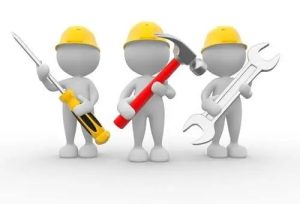
- Scheduled Maintenance:
- Develop a maintenance schedule based on manufacturer recommendations, operational hours, or usage. Regularly inspect and service machinery components such as engines, belts, bearings, filters, and fluids.
- Plan maintenance activities during scheduled downtime to minimize disruption to production.
- Preventive Maintenance:
- Perform routine inspections, cleaning, lubrication, and adjustments to prevent potential issues.
- Replace worn or damaged parts before they fail to prevent costly breakdowns.
- Predictive Maintenance:
- Use advanced technologies such as sensors, data analytics, and condition monitoring to predict when maintenance is needed based on equipment performance and health data.
- Predictive maintenance helps identify issues before they lead to major failures and allows for more efficient planning of maintenance activities.
- Corrective Maintenance:
- Address unexpected breakdowns promptly to minimize downtime. Have a plan in place to quickly respond to emergencies and ensure the availability of necessary spare parts.
- Conduct thorough root cause analysis to understand why the breakdown occurred and take corrective actions to prevent recurrence.
- Operator Training:
- Properly train equipment operators to use machinery correctly, follow maintenance procedures, and identify early signs of potential problems.
- Operators can play a significant role in preventing wear and tear by using equipment in a responsible manner.
- Documentation and Records:
- Maintain detailed records of maintenance activities, including dates, performed tasks, replaced parts, and any observations. This information helps track equipment history and informs future maintenance decisions.
- Spare Parts Management:
- Maintain an inventory of critical spare parts to quickly address breakdowns. Identify key components that may have longer lead times for replacement.
- Environmental Conditions:
- Ensure machinery operates within recommended environmental conditions (temperature, humidity, etc.) to prevent accelerated wear and corrosion.
- Cleaning and Lubrication:
- Regularly clean machinery to prevent the accumulation of debris, which can affect performance and cause overheating.
- Proper lubrication of moving parts reduces friction and extends the lifespan of components.
- Vendor Support and Manuals:
- Establish a relationship with equipment vendors for technical support, training, and access to manuals and documentation.
- Continuous Improvement:
- Regularly review maintenance processes and outcomes to identify opportunities for improvement. Implement feedback and lessons learned to refine maintenance practices.
Remember that the specific maintenance approach will vary based on the type of machinery, its usage, and the industry it serves. Regular and well-executed maintenance practices can lead to increased equipment reliability, reduced operational costs, and improved overall efficiency.
